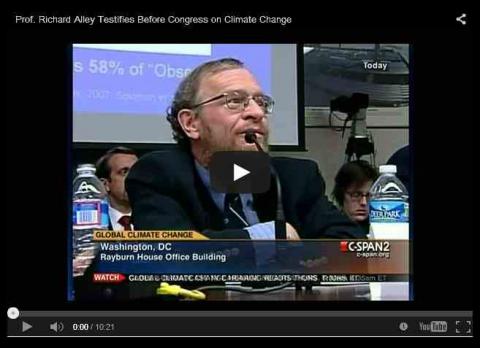The recent elections returned Republicans to control of the Senate, which means all the committees within the chamber will see their leadership change. This really shouldn't be a scientific issue. And yet, in the current environment, where science is often a political football, it really will be one.
To understand why, you just have to look at what's happened with the House Science Committee, where Republicans have been in power for several years and have put someone on the committee who has called evolution a satanic lie. This has led to some fabulously embarrassing moments (captured nicely by Jon Stewart and also visible in the video below) , as people who would flunk second grade geography pepper PhDs with what they seem to think will be "gotcha" questions.
But the problem hasn't just been that congressmen have proven themselves immune to public embarrassment. The committee has also attempted to redefine the mission of the National Science Foundation and has sent investigators poking into the peer review that approved grants that the ranking congressmen don't like. It has the potential to have a chilling impact on scientific inquiry.
Environment? What environment?
So, is the Senate likely to repeat this? In some cases, quite possibly. The Senate's Environment and Public Works Committee has seen James Inhofe rise to the chairmanship. Inhofe goes well beyond the standard Republican's "I'm not a scientist" line. Inhofe has penned a book in which he calls climate change "The Greatest Hoax." His reason it can't be happening? God is in control. "God's still up there," Inhofe wrote, decrying the "arrogance of people to think that we, human beings, would be able to change what He is doing in the climate... " And he's already taken some of that language into congressional debate.
He'll have plenty of company if he follows through in the future. Roger Wicker of Mississippi was the ranking member of the Green Jobs and the New Economy subcommittee, and thus likely to take over. Wicker has joined in on the "war on coal" rhetoric and called climate science "disputed." He's also travelled to climate summits as part of Inhofe's self-described "truth squads."
Water and Wildlife will likely see Idaho's John Boozman take charge. Boozman has publicly wondered whether climate change might be a natural cycle—"Is man causing it, or, you know, is this a cycle that happens throughout the years, throughout the ages"—which made our list of climate arguments that are so stupid they shouldn't be used. But the interview makes it clear what his real issue is: his home state of Arkansas is "a coal fired state," so cap and trade would destroy its economy.
Jeff Sessions is in line to take over the Clean Air and Nuclear Safety subcommittee. Sessions has felt he can interpret the climate data better than scientists and has said that "alarmist claims made by the Administration are contradicted by scientific evidence." And about the best we could hope for in Environment and Public Works is the Subcommittee on Superfund, Toxics and Environmental Health, where Idaho Senator Mike Crapo at least recognizes that the whole thing is an issue for the scientists to clarify.
Commerce, That Other Thing, and Transportation
In the Senate, the other group that deals with scientific issues is the Commerce, Science, and Transportation Committee. The new chair of that committee, John Thune of South Dakota, made the news for actually accepting that humanity is contributing to climate change. But some of the senators serving under him have been less accepting of scientific evidence.
Florida's Marco Rubio has been given the chair of the Subcommittee on Oceans, Atmosphere, Fisheries, and Coast Guard, which oversees NOAA, a major source of data on our changing climate. Rubio is probably most noted for having dropped the “I'm not a scientist, man,” phrase when asked about the age of the Earth and followed that by saying, “I'm not sure we'll ever be able to answer that. It's one of the great mysteries.” (He walked that back a few days later.)
But, although Rubio's not a scientist, he's perfectly happy to tell scientists they don't know what they're talking about. “I do not believe that human activity is causing these dramatic changes to our climate the way these scientists are portraying it,” Rubio said on TV. The Los Angeles Times, naturally, lists a report that says climate change is already affecting the US as a related story.
Ted Cruz of Texas is going to be put in charge of the US' other major source of climate data, NASA, as head of the Subcommittee on Space, Science, and Competitiveness. Cruz is another one who thinks he knows more than scientists. After being asked about the melting of Arctic sea ice, he told CNN "Other parts are going up. It is not—you know, you always have to be worried about something that is considered a so-called scientific theory that fits every scenario. Climate change, as they have defined it, can never be disproved, because whether it gets hotter or whether it gets colder, whatever happens, they'll say, well, it's changing, so it proves our theory."
While most of these senators can be counted on to use their new positions to launch attacks on climate science, Cruz will be in perhaps the most interesting position. Texas is a major recipient of NASA money, leaving its congressional representatives fiercely defensive regarding the agency's budget. But Cruz has been pretty consistent across the board in his desire to limit or eliminate federal spending, even when the actions have come at great economic cost. Plus, for him, there's the added motivation that he doesn't believe the results of a lot of NASA's work or the conclusions of the people the agency employs.
How he manages those competing political imperatives may go a long way toward determining NASA's near-term future.


Spread the word